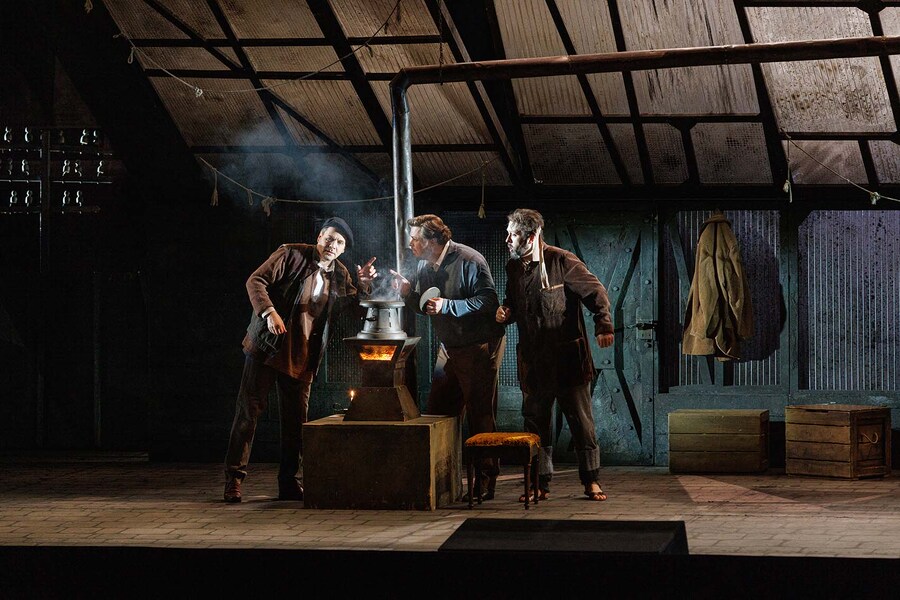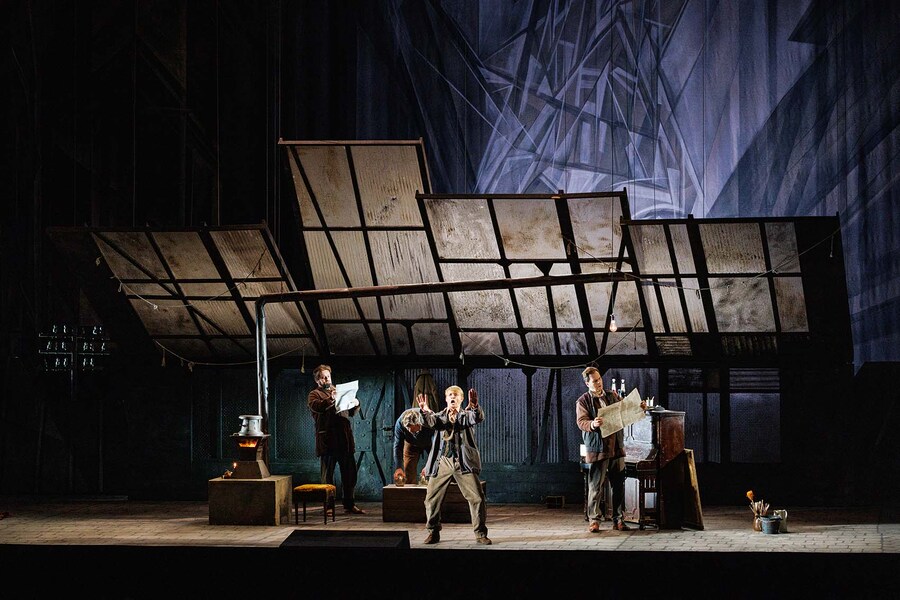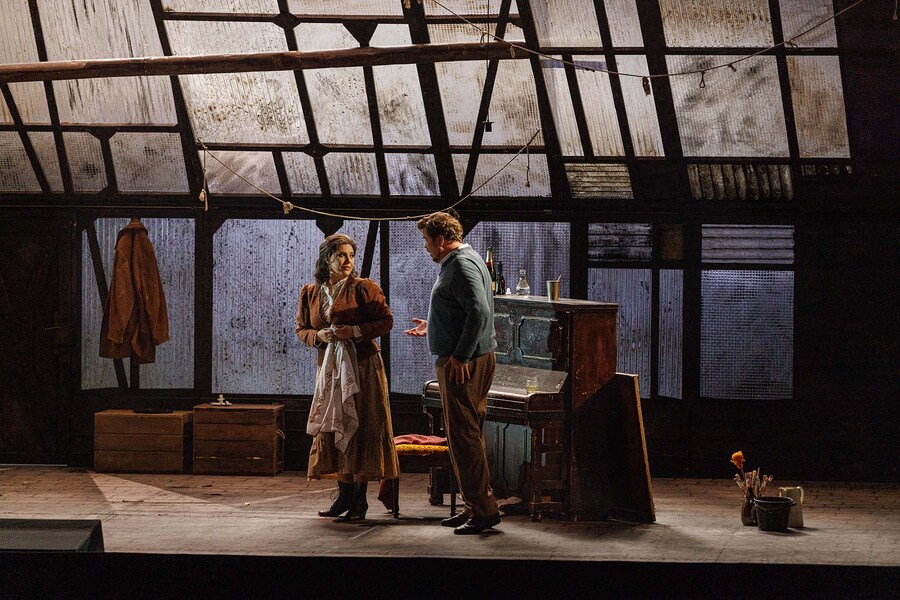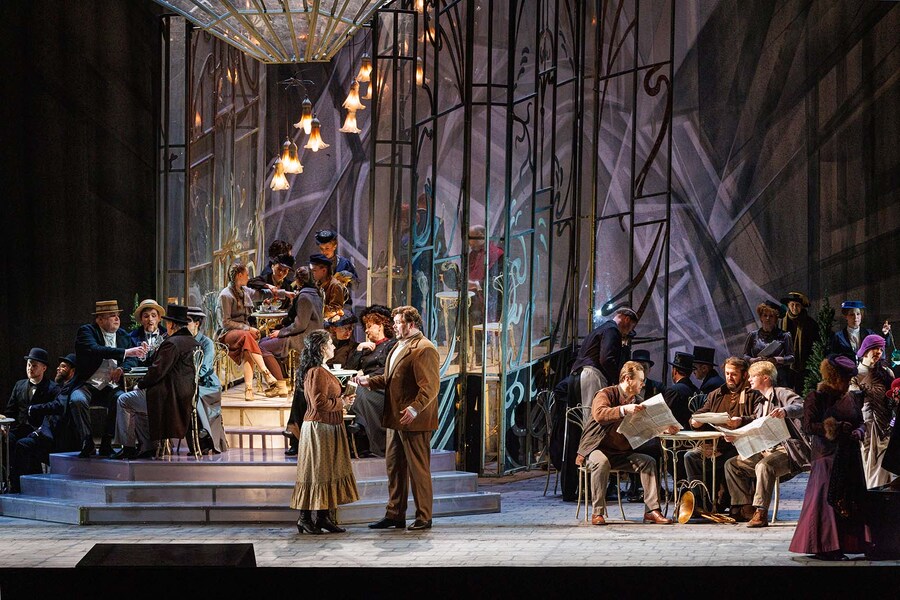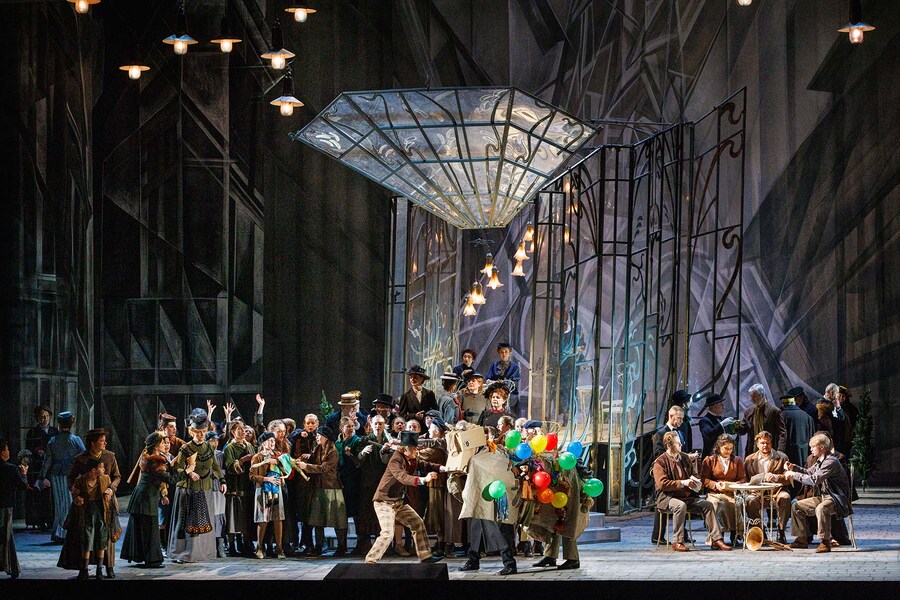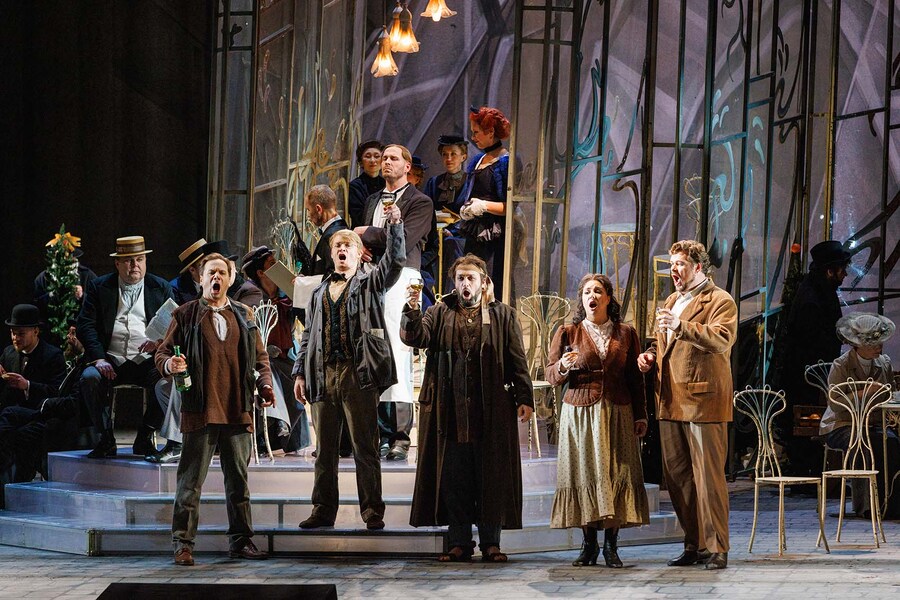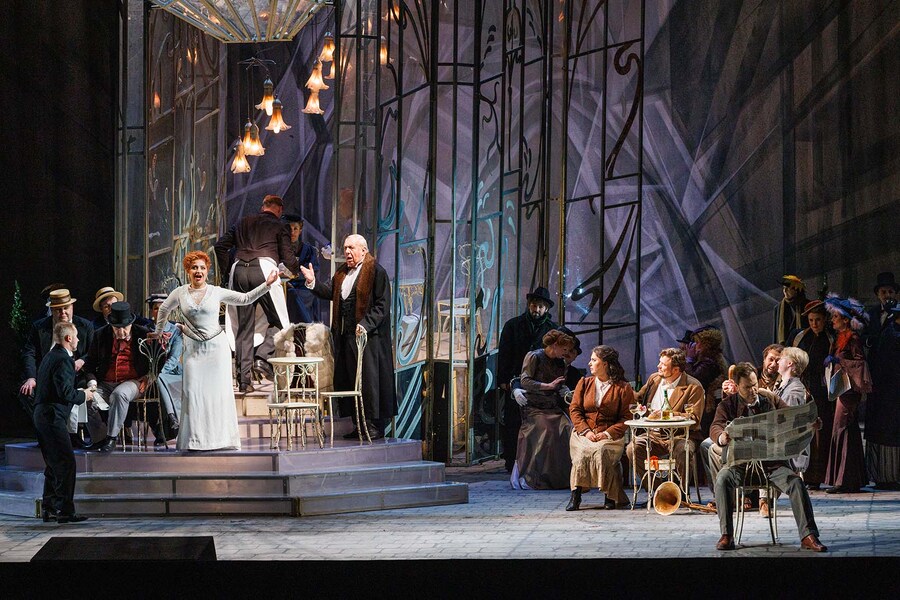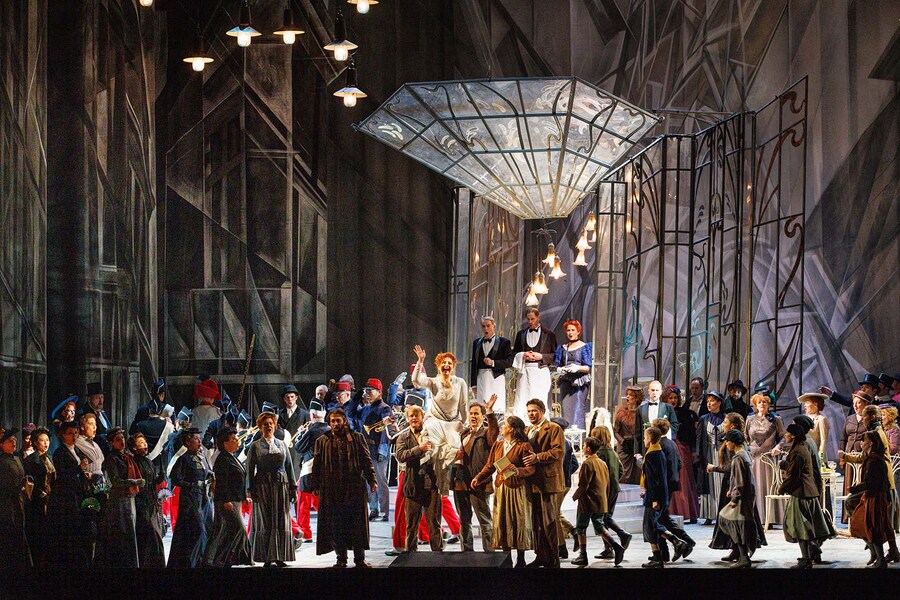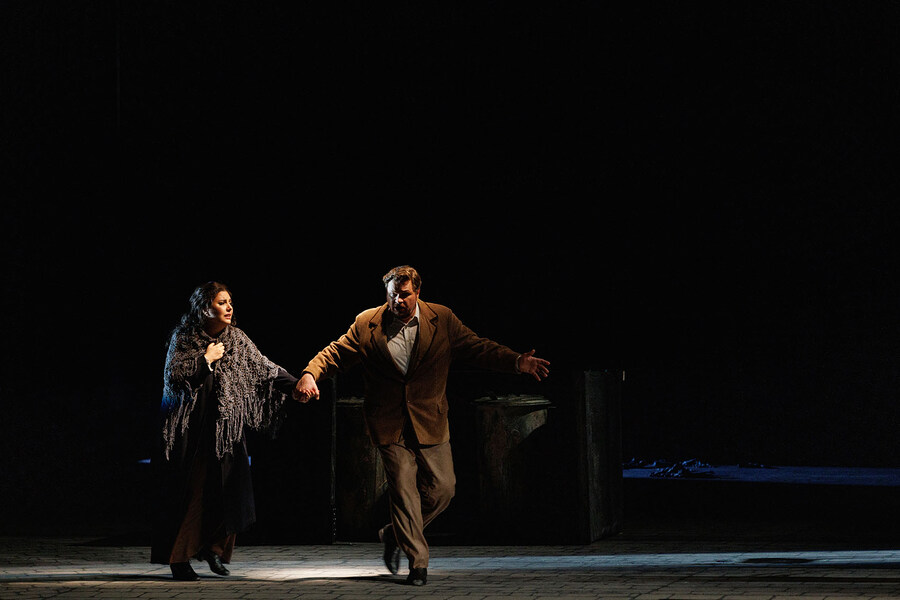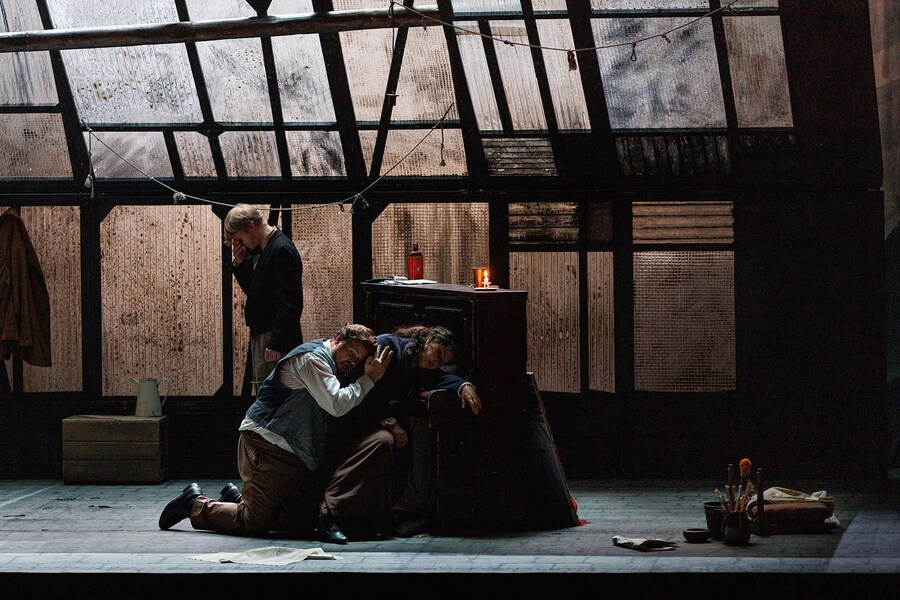Goes straight to the heart: the story of young people in search of happiness.
Scenes of „La vie de Bohème“ (Henri Murger) in four pictures
Libretto by Giuseppe Giacosa and Luigi Illica
Performed in Italian with German and English surtitles
Premiere
23. October 1983
Dates & Cast
- Conductor Stefano Ranzani (31. August, 20. September, 10., 26. October 2025), Matteo Beltrami (15., 21. November, 05., 12. December 2025)
- Inszenierung nach Christine Mielitz
- Bühne & Kostüme Peter Heilein
- Lighting Design Friedewalt Degen
- Choir Jonathan Becker
- Children Choir Claudia Sebastian-Bertsch, Kinderchor der Semperoper Dresden
- Dramaturgy Mathias Rank
- Mimì Yaritza Véliz (20. September, 10. October 2025), Elbenita Kajtazi (26. October, 15., 21. November 2025), Isabela Díaz (05., 12. December 2025), Nicole Car (31. August 2025)
- Musetta Rosalia Cid (31. August, 10., 26. October, 21. November, 05., 12. December 2025), Nikola Hillebrand (20. September, 15. November 2025)
- Rodolfo Attilio Glaser (10. October 2025), José Simerilla Romero (20. September, 26. October, 15., 21. November 2025), Bekhzod Davronov (05., 12. December 2025), Long Long (31. August 2025)
- Marcello Danylo Matviienko (20. September, 10. October 2025), Christoph Pohl (26. October 2025), Sean Michael Plumb (31. August, 15., 21. November, 05., 12. December 2025)
- Schaunard Anton Beliaev (20. September, 10. October 2025), Neven Crnić (31. August, 26. October, 15., 21. November, 05., 12. December 2025)
- Colline Vladyslav Buialskyi (31. August, 20. September, 10. October 2025), Alexandros Stavrakakis (26. October, 05., 12. December 2025), Peter Kellner (15., 21. November 2025)
- Benoît Hans-Joachim Ketelsen
- Alcindoro Bernd Zettisch
- Parpignol Frank Blümel (31. August, 10. October, 15. November, 05. December 2025), Jun-Seok Bang (20. September, 26. October, 21. November, 12. December 2025)
- Sergeant der Zollwache Holger Steinert (31. August, 10. October, 05. December 2025), Matthias Beutlich (20. September, 26. October, 21. November, 12. December 2025), Norbert Klesse (15. November 2025)
- Ein Zöllner Norbert Klesse (10. October 2025), Andreas Heinze (31. August, 20. September, 26. October, 15., 21. November, 05., 12. December 2025)
- Ein Händler Hyunkwang Jo (31. August, 10. October, 15. November 2025), Kyungrak Jeong (20. September, 26. October, 21. November, 05., 12. December 2025)
- Conductor Stefano Ranzani
- Inszenierung nach Christine Mielitz
- Bühne & Kostüme Peter Heilein
- Lighting Design Friedewalt Degen
- Choir Jonathan Becker
- Children Choir Claudia Sebastian-Bertsch, Kinderchor der Semperoper Dresden
- Dramaturgy Mathias Rank
Kinderchor der Semperoper Dresden
Sächsische Staatskapelle Dresden
- Mimì Nicole Car
- Musetta Rosalia Cid
- Rodolfo Long Long
- Marcello Sean Michael Plumb
- Schaunard Neven Crnić
- Colline Vladyslav Buialskyi
- Benoît Hans-Joachim Ketelsen
- Alcindoro Bernd Zettisch
- Parpignol Frank Blümel
- Sergeant der Zollwache Holger Steinert
- Ein Zöllner Andreas Heinze
- Ein Händler Hyunkwang Jo
- Conductor Stefano Ranzani
- Inszenierung nach Christine Mielitz
- Bühne & Kostüme Peter Heilein
- Lighting Design Friedewalt Degen
- Choir Jonathan Becker
- Children Choir Claudia Sebastian-Bertsch, Kinderchor der Semperoper Dresden
- Dramaturgy Mathias Rank
Kinderchor der Semperoper Dresden
Sächsische Staatskapelle Dresden
- Mimì Yaritza Véliz
- Musetta Nikola Hillebrand
- Rodolfo José Simerilla Romero
- Marcello Danylo Matviienko
- Schaunard Anton Beliaev
- Colline Vladyslav Buialskyi
- Benoît Hans-Joachim Ketelsen
- Alcindoro Bernd Zettisch
- Parpignol Jun-Seok Bang
- Sergeant der Zollwache Matthias Beutlich
- Ein Zöllner Andreas Heinze
- Ein Händler Kyungrak Jeong
- Conductor Stefano Ranzani
- Inszenierung nach Christine Mielitz
- Bühne & Kostüme Peter Heilein
- Lighting Design Friedewalt Degen
- Choir Jonathan Becker
- Children Choir Claudia Sebastian-Bertsch, Kinderchor der Semperoper Dresden
- Dramaturgy Mathias Rank
Kinderchor der Semperoper Dresden
Sächsische Staatskapelle Dresden
- Mimì Yaritza Véliz
- Musetta Rosalia Cid
- Rodolfo Attilio Glaser
- Marcello Danylo Matviienko
- Schaunard Anton Beliaev
- Colline Vladyslav Buialskyi
- Benoît Hans-Joachim Ketelsen
- Alcindoro Bernd Zettisch
- Parpignol Frank Blümel
- Sergeant der Zollwache Holger Steinert
- Ein Zöllner Norbert Klesse
- Ein Händler Hyunkwang Jo
- Conductor Stefano Ranzani
- Inszenierung nach Christine Mielitz
- Bühne & Kostüme Peter Heilein
- Lighting Design Friedewalt Degen
- Choir Jonathan Becker
- Children Choir Claudia Sebastian-Bertsch, Kinderchor der Semperoper Dresden
- Dramaturgy Mathias Rank
Kinderchor der Semperoper Dresden
Sächsische Staatskapelle Dresden
- Mimì Elbenita Kajtazi
- Musetta Rosalia Cid
- Rodolfo José Simerilla Romero
- Marcello Christoph Pohl
- Schaunard Neven Crnić
- Colline Alexandros Stavrakakis
- Benoît Hans-Joachim Ketelsen
- Alcindoro Bernd Zettisch
- Parpignol Jun-Seok Bang
- Sergeant der Zollwache Matthias Beutlich
- Ein Zöllner Andreas Heinze
- Ein Händler Kyungrak Jeong
- Conductor Matteo Beltrami
- Inszenierung nach Christine Mielitz
- Bühne & Kostüme Peter Heilein
- Lighting Design Friedewalt Degen
- Choir Jonathan Becker
- Children Choir Claudia Sebastian-Bertsch, Kinderchor der Semperoper Dresden
- Dramaturgy Mathias Rank
Kinderchor der Semperoper Dresden
Sächsische Staatskapelle Dresden
- Mimì Elbenita Kajtazi
- Musetta Nikola Hillebrand
- Rodolfo José Simerilla Romero
- Marcello Sean Michael Plumb
- Schaunard Neven Crnić
- Colline Peter Kellner
- Benoît Hans-Joachim Ketelsen
- Alcindoro Bernd Zettisch
- Parpignol Frank Blümel
- Sergeant der Zollwache Norbert Klesse
- Ein Zöllner Andreas Heinze
- Ein Händler Hyunkwang Jo
- Conductor Matteo Beltrami
- Inszenierung nach Christine Mielitz
- Bühne & Kostüme Peter Heilein
- Lighting Design Friedewalt Degen
- Choir Jonathan Becker
- Children Choir Claudia Sebastian-Bertsch, Kinderchor der Semperoper Dresden
- Dramaturgy Mathias Rank
Kinderchor der Semperoper Dresden
Sächsische Staatskapelle Dresden
- Mimì Elbenita Kajtazi
- Musetta Rosalia Cid
- Rodolfo José Simerilla Romero
- Marcello Sean Michael Plumb
- Schaunard Neven Crnić
- Colline Peter Kellner
- Benoît Hans-Joachim Ketelsen
- Alcindoro Bernd Zettisch
- Parpignol Jun-Seok Bang
- Sergeant der Zollwache Matthias Beutlich
- Ein Zöllner Andreas Heinze
- Ein Händler Kyungrak Jeong
- Conductor Matteo Beltrami
- Inszenierung nach Christine Mielitz
- Bühne & Kostüme Peter Heilein
- Lighting Design Friedewalt Degen
- Choir Jonathan Becker
- Children Choir Claudia Sebastian-Bertsch, Kinderchor der Semperoper Dresden
- Dramaturgy Mathias Rank
Kinderchor der Semperoper Dresden
Sächsische Staatskapelle Dresden
- Mimì Isabela Díaz
- Musetta Rosalia Cid
- Rodolfo Bekhzod Davronov
- Marcello Sean Michael Plumb
- Schaunard Neven Crnić
- Colline Alexandros Stavrakakis
- Benoît Hans-Joachim Ketelsen
- Alcindoro Bernd Zettisch
- Parpignol Frank Blümel
- Sergeant der Zollwache Holger Steinert
- Ein Zöllner Andreas Heinze
- Ein Händler Kyungrak Jeong
- Conductor Matteo Beltrami
- Inszenierung nach Christine Mielitz
- Bühne & Kostüme Peter Heilein
- Lighting Design Friedewalt Degen
- Choir Jonathan Becker
- Children Choir Claudia Sebastian-Bertsch, Kinderchor der Semperoper Dresden
- Dramaturgy Mathias Rank
Kinderchor der Semperoper Dresden
Sächsische Staatskapelle Dresden
- Mimì Isabela Díaz
- Musetta Rosalia Cid
- Rodolfo Bekhzod Davronov
- Marcello Sean Michael Plumb
- Schaunard Neven Crnić
- Colline Alexandros Stavrakakis
- Benoît Hans-Joachim Ketelsen
- Alcindoro Bernd Zettisch
- Parpignol Jun-Seok Bang
- Sergeant der Zollwache Matthias Beutlich
- Ein Zöllner Andreas Heinze
- Ein Händler Kyungrak Jeong
In brief
A shared flat in Paris’s bohemian world of artists and students: The lives of the poet Rodolfo and his friends are filled with talk of freedom, independence, art, as well as financial hardship. When Rodolfo falls in love with his neighbour Mimì, everything seems to have taken a turn for the better, but poverty and Mimì’s illness overshadow the relationship. The young couple become closely attached. Later they separate, only rediscovering their love when it is already too late. At the time of its premiere in 1896, Puccini’s best-known work broke new ground in Italian opera through its prosaic scenery and everyday subject matter. This staging by Christine Mielitz of Puccini’s fourth opera is one of the most popular productions at the Semperoper.
Storyline
First act
Christmas Eve, in an icy-cold garret looking onto the roofs of the Latin Quarter in Paris, around the turn of the century. Just as Marcello, fingers numb with cold, attempts to finish his painting which seems to remain eternally unfinished, Rodolfo compels himself to write. Both fail. To save the last chair from being broken up and burnt, Rodolfo sacrifices the manuscript of his play, act for act, to the flames. Colline, returning unsuccessful from the closed pawnbroker’s shop, is just able to catch a glimpse of the last warming glow of the stove. Schaunard then appears with his treasures which he was able to get by trickery from a snobbish Englishman due to the murder – announced with much theatricality – of the latter’s parrot. The „sumptuous feast“, full of merriment and high spirits, is interrupted by Benoît, the landlord, who wishes to collect the overdue rent but he can be cunningly sent away owing to his own double standard of morals. They decide to spend the rest of Christmas Eve at Café Momus. It is only Rodolfo who stays behind for the time being in order to write a newspaper article. Then Mimì appears, a neighbour of the Bohemians, and asks for a light for her candle which has gone out. The little seamstress and the poet fall in love in the moonlight of the December evening.
Second act
In the bustling, gay throng of the Christmas market in front of Café Momus, Rodolfo introduces Mimì to his circle of Bohemian friends. Marcello’s bitter reasoning about love reaches its climax when the cause of his pain, the coquettishly provocative Musetta, appears on the arm of the elderly councillor, Alcindoro. – She wins Marcello back by her own fascination. The cuckolded Alcindoro is left to pay the bill.
Third act
Ash Wednesday on the bleak outskirts of Paris. Mimì is desperately looking for Rodolfo and hopes that Marcello will give her information and also advice. However, he only advises her cynically to let the jealous poet go. Believing incorrectly that Mimì has already left, Rodolfo tells his friend that ha has parted with the girl because of her fatal illness. A fit of coughing betrays Mimì. Cornered by the situation, Rodolfo assures her that he will „delay“ the parting. Marcello, who had just recommended that love should not be taken so tragically, now himself fails because of the incompatible emotions lingering between himself and Musetta: a renewed quarrel, a renewed parting.
Fourth act
Back in the garret, Marcello and Rodolfo attempt to conceal their feelings with work but the slightest occasion leads their thoughts back to Musetta and Mimì. Colline and Schaunard appear and wish to celebrate a „princely feast“ but they can only afford ... a herring. Musetta’s precipitous entrance with the fatally ill Mimì destroys all pseudo feelings for celebration of the four Bohemians. Deeply affected, they are forced to watch as a human life expires before their very eyes. All attempts to alter fate and bride it with jewels, money or an old coat miscarry. Now the friends are presented with the price of a misspent life. One last time, Rodolfo and Mimì recall their first, tender and loving encounter and then the girl dies. Deeply moved, the Bohemians are left behind.
Explore
La bohème
